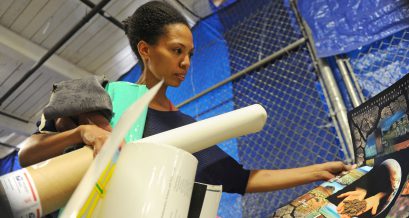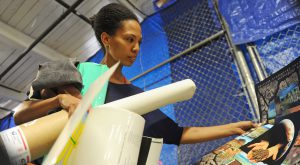In addition to the abuse, coercive control and manipulation victims of human trafficking routinely face, many victims are arrested and convicted for crimes they are forced to engage in by their traffickers. This is particularly true for victims exploited through commercialized sex, who are commonly arrested for the crime of prostitution.
-
Addiction is a disease of cravings
Monday, September 10, 2012Addiction is truly a brain disease and not simply a behavior that someone can stop automatically. It is neurochemically driven, and not due to “moral weakness” or lack of “will power.” Unfortunately, it is one of the few chronic diseases where normally caring health care providers treat patients poorly because of misguided notions like “it’s their own fault, they should just stop using drugs.”
-
Audacious Thinking: Fall 2012
Saturday, September 01, 2012This issue of Audacious Thinking features a social justice report card, interviews with young professionals in the city, and a list of 2012 Alumni Fellows grants…
-
Back to School Baltimore!
Monday, August 20, 2012Imagine the first day of school; students energized by their long summer holiday, excited to see friends from the prior year, eager to meet their new teachers, curious about where their cubbies or lockers are, prepared to turn in important information like their health cards for the school nurse and their emergency cards for the office, and ready to get back into the swing of things at school. The first day sets the tone for the year and presents students with lots of critical information: introductions, goals and expectations.
-
Challenging the black/white dichotomy in Baltimore race talk
Monday, August 13, 2012As an Indian-American woman who finds it important to regularly talk about the impact of race in our daily lives, Baltimore City fits me well. Yet, in a city where race pervades all discussions about improving Baltimore, when will Asian and Latino voices be welcomed into the fold? When provided space, our voices are relegated to “special forums,” perpetuating the foreignness of Asian and Latino experiences.
-
A much better plan for kids statewide
Wednesday, August 01, 2012All children in Maryland, well behaved or otherwise, are guaranteed the right to an education. Yet, schools across the state are pushing children out with high rates of suspensions, primarily for non-violent acts.
-
A garden inside the Baltimore City Detention Center
Monday, July 30, 2012As I walk into the Baltimore City Detention Center for my weekly garden class, a guard remarks on how big the plants are getting. I place my belongings into a bin and get patted down, and another employee tells me about her own garden. I tell her about the direction of the program, and for better serving the juveniles locked up there, facing adult charges. When they get out, I hope to be able to provide them with community service options or assist them in getting jobs in the field of horticulture. My hope for the city is that we can use gardening in schools, churches, and transition environments to heal and build stronger and healthier communities.
-
A humane education: teaching positive reinforcement in the classroom
Monday, July 23, 2012The Kids-4-K9s Humane Education Program offers students and teachers an opportunity to focus on positive changes, instead of failures. “I like the way we ignore Bella when she doesn’t get it right and wait to praise her when she does,” one third grade student shared as part of his journal entry for the session. It is this kind of reflection and sharing that promotes real learning and growth that can extend far beyond the classroom.
-
More than just a garden
Monday, July 16, 2012We live in a time when the social contract between individual and society has become implicit. We forget that as individuals we engage in our community, our government, and with our neighbors because they are there for our benefit as we are for theirs—to make our lives better than if we went on alone. For the members of low-income, underserved communities such as Brooklyn/Curtis Bay however, this contract has failed.
-
Guaranteeing appropriate medical care for all
Monday, July 09, 2012Since the health of each member in any community is a collective responsibility of the community as a whole, I’d like to propose an idea that should not be audacious at all: to be a responsible community, our country needs to join the rest of the developed world in establishing a health care system where routine access to appropriate medical care for every member is not only a possibility, but a certainty.




